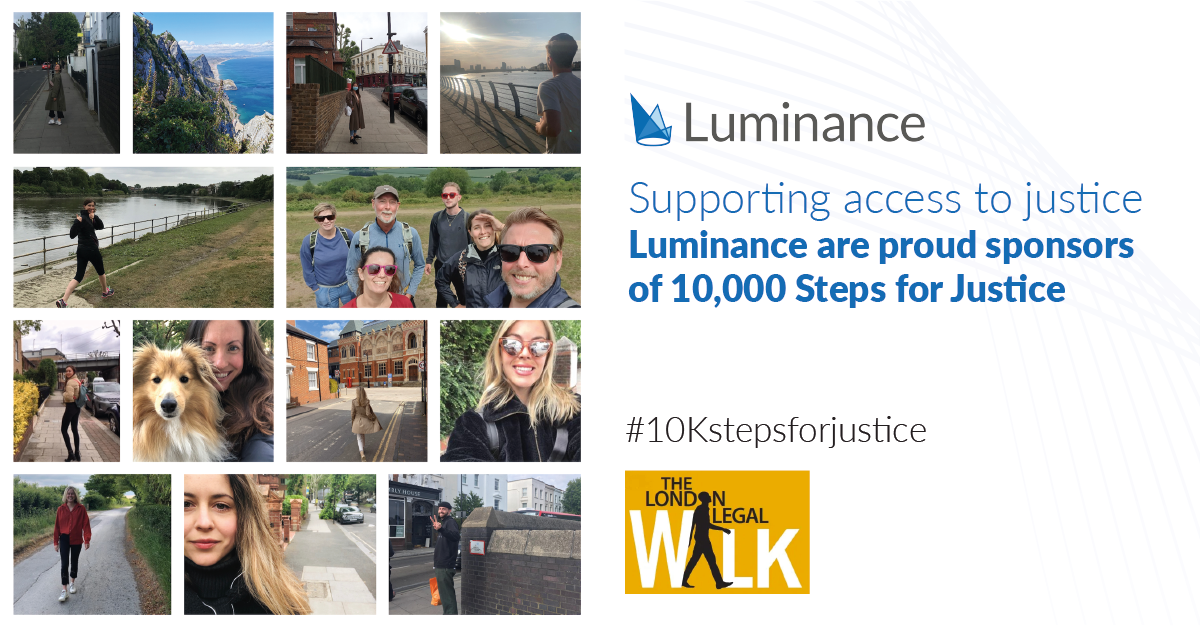
Blog
Luminance proudly sponsors the 10,000 Steps for Justice challenge
9 June 2020 | Luminance
Access to justice is a basic principle of the rule of law. Delivery of justice should be impartial and non-discriminatory, yet in practice this is rarely the case. The worldwide pandemic has thrown judicial systems into disarray through court closures, and many barristers have been vocal about the lack of funds they face as cases are delayed. Indeed, the effects of the pandemic on the legal aid sector have been hugely damaging, threatening the future of an already fragile sector. There has perhaps never been a more critical time to address wide disparities in access to justice. Therefore, this Monday 8th June, Luminance were proud to sponsor the 10,000 Steps For Justice challenge, to raise funds and awareness for the London Legal Support Trust (LLST). Supporting law centres and legal advice agencies to provide legal aid to those most in need, the LLST helps to combat issues such as homelessness, debt problems, discrimination and exploitation.
In light of the Covid-19 outbreak, there will be a significant rise in emergency funding applications from advice agencies, meaning that fundraising for the LLST is now more critical than ever. Coronavirus only compounds the precarious position that such services find themselves in following a decade of funding cuts to legal aid, increased court fees and court closures. The lack of affordable legal service options has resulted in nearly 60% of people in England and Wales believing that the legal system is not set up for ordinary people, whilst 43% of small business owners and self-employed people believe that legal advice is reserved for big businesses or those that can afford it, according to research by NESTA.
Legal tech has a role to play in helping to tackle unmet legal need, and to make the intricacies of the law, legal jargon and legal systems more accessible to the layperson. Take for example apps such as LegalZoom or Tomorrow which allow anyone to set up a will for themselves, without a lawyer’s involvement. Where technology cannot be a substitute for a part of lawyers’ work, legal tech is helping customers to connect with lawyers through interfaces such as Billy Bot, a chatbot which functions similarly to a legal clerk, matching clients with solicitors, barristers and lawyers and settling fees. The transformation and increased adoption of legal technologies has only been hastened by Covid-19, with one prominent example being the introduction of virtual courts globally. These online hearing rooms have provided efficiencies which, in the long run, could lead to lower costs and perhaps go some way in tackling the acute problem of access to justice.
In fact, there are countless examples of innovation improving the efficiency with which lawyers can work; in particular, the application of AI technology to legal processes can cut time spent in document review by up to 90% . It is estimated that the adoption of new technologies in the legal sector could more than double productivity growth from 1.3% to 2.7% per year. These gains can be passed on to clients, and as AI means fewer lawyers are required on each project, firms can take additional projects to generate additional revenue and perhaps also afford to take on additional increased pro-bono legal services.
However, until AI technologies become the industry norm, and the ensuing changes in legal working practice are enacted, it is essential that we continue to enable everyone in need to have access to legal services. As such, organisations such as the London Legal Support Trust are playing an essential role. We are incredibly grateful for their continued efforts, and proud to be sponsors of the London Legal Walk this year.